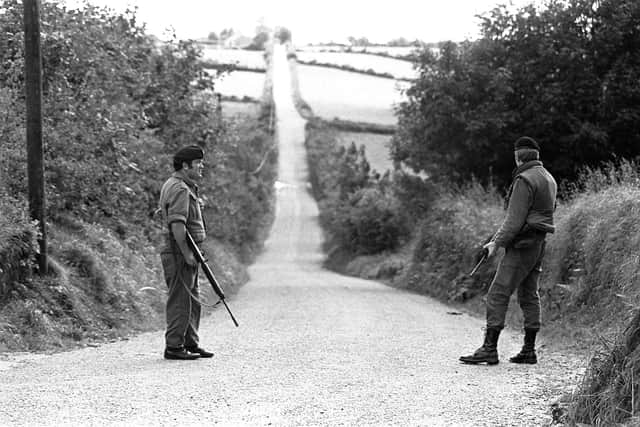Irish government 'being duplicitous' by 'banging the drum' over UK's failings on the legacy of the Troubles, says Ulster Unionist MLA
and live on Freeview channel 276
Tom Elliott made the comments after the High Court in Belfast ruled the UK government’s truth-and-reconciliation-style Troubles amnesty to be unlawful.
The ruling today is separate to a legal challenge being brought by the Irish government against the same law.
Advertisement
Hide AdAdvertisement
Hide AdReacting to the news, Sinn Fein’s Pearse O’Doherty, a TD for Donegal and the party’s deputy leader in the Dail, said he “welcomed” the ruling of the High Court, and asked for an update on where it leaves the Dublin government’s own case against the act.


Fine Gael Wicklow TD Simon Harris, the Irish government’s science minister, then said that the judgement “seems positive from the perspective of the Irish Government, which wants to work to ensure that all families get justice, which is what they deserve”.
Mr Elliott, a former UUP leader and justice spokesman who represents Fermanagh and South Tyrone in the Assembly (and was formerly a UDR member), told the News Letter: “Obviously the Irish government is being duplicitous, because they haven't come up to the mark on supporting and providing information when required to help solve some of the murders in Northern Ireland.
"I believe they've fallen short, and so it is duplicitous of them to be beating the drum on this one. I think they've a lot of work to do themselves, and have been slow in doing it.
Advertisement
Hide AdAdvertisement
Hide Ad"Of course in the past their territory was used to harbour terrorists who murdered people in Northern Ireland, and just slipped across the border into the Republic, and seemed to get safe haven from some.
"I'm not saying it was the Irish government giving them safe haven, but quite often my view was that they didn't do enough to get those people extradited or bring them to justice.”
The refusal of authorities in the south to extradite IRA suspects was a running sore for the UK during the Troubles.
A Timothy J. Duffy, writing on the issue in 1991 in the US Dickinson Journal of International Law, detailed the enormous lengths which the UK authorities went to to try and extradite Dermot Finucane, an IRA man (and brother of Pat Finucane) who was found to have stabbed multiple people during the Maze jailbreak.
Advertisement
Hide AdAdvertisement
Hide AdIn 1987 no fewer than 20 arrests warrants for him were issued in Northern Ireland, but though he had been detained by the southern authorities, he sought to exploit a clause which said that extradition could be thwarted from the Republic if it was for a “political offence”.
Ultimately, after many hearings, the Supreme Court found in his favour.
“Therefore,” Mr Duffy wrote, “a convicted IRA terrorist was set free”.
He detailed other legal battles too, such as the case of a man who was caught with an assault rifle, fled south, and whom a court then refused to extradite.
Advertisement
Hide AdAdvertisement
Hide AdSpeaking on the same theme today, DUP deputy leader Gavin Robinson said the Irish Government had “displayed breathtaking arrogance”.
"It is fast out of the blocks to lambast the UK for its approach, yet victims are crying out for Dublin to investigate claims around atrocities such as Omagh,” he said.
Meanwhile Jim Cannon, a former member of An Garda Siochana who narrowly survived being blown up by the IRA in 1976 (whilst his colleague Michael Clerkin was killed), said "victims and survivors like myself in the Republic of Ireland were delighted today to hear the news" that the Belfast High Court had found the amnesty unlawful.
Read his survival story here – Buried alive: Garda remembers 'miracle' escape from fatal IRA bomb
Advertisement
Hide AdAdvertisement
Hide AdHowever, he added that "in the years gone by there could've been a lot more done – we always felt that down here”, particularly when it came to the southern state’s support for the wounded survivors.
But he was insistent that he and fellow front-line officers “did our very best” to deal with the IRA.
"I was involved in a lot of those investigations myself, and as far as An Garda Siochana were concerned we did the best we could to bring the offenders to justice – that's all we could do,” he said.